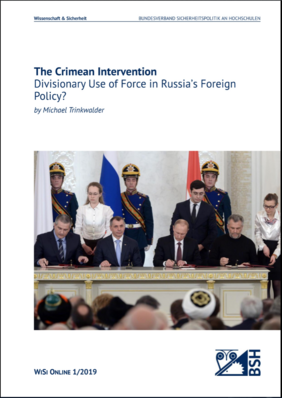What this interpretation and arguably most explanations for Moscow’s motives have in common is a strong focus on Russia’s foreign policy interests. However, while Russia’s annexation of Crimea and military intervention in Eastern Ukraine has arguably done little to strengthen Russia’s geopolitical position, it has undoubtedly strengthened President Putin’s hold on power. Accordingly, the theoretical framework of diversionary conflict might offer a more plausible explanation of Russian Foreign policy. The paper will briefly discuss the theory of diversionary action. In the following, the domestic incentive for diversionary action in Russia will be analyzed, Ukraine’s suitability as a target will be considered and finally, the domestic effects of Russia’s intervention will be evaluated.
- Aktuelles
- Der Verband
- Akademien & Seminare
- Hochschulgruppen
- Publikationen
- Termine

